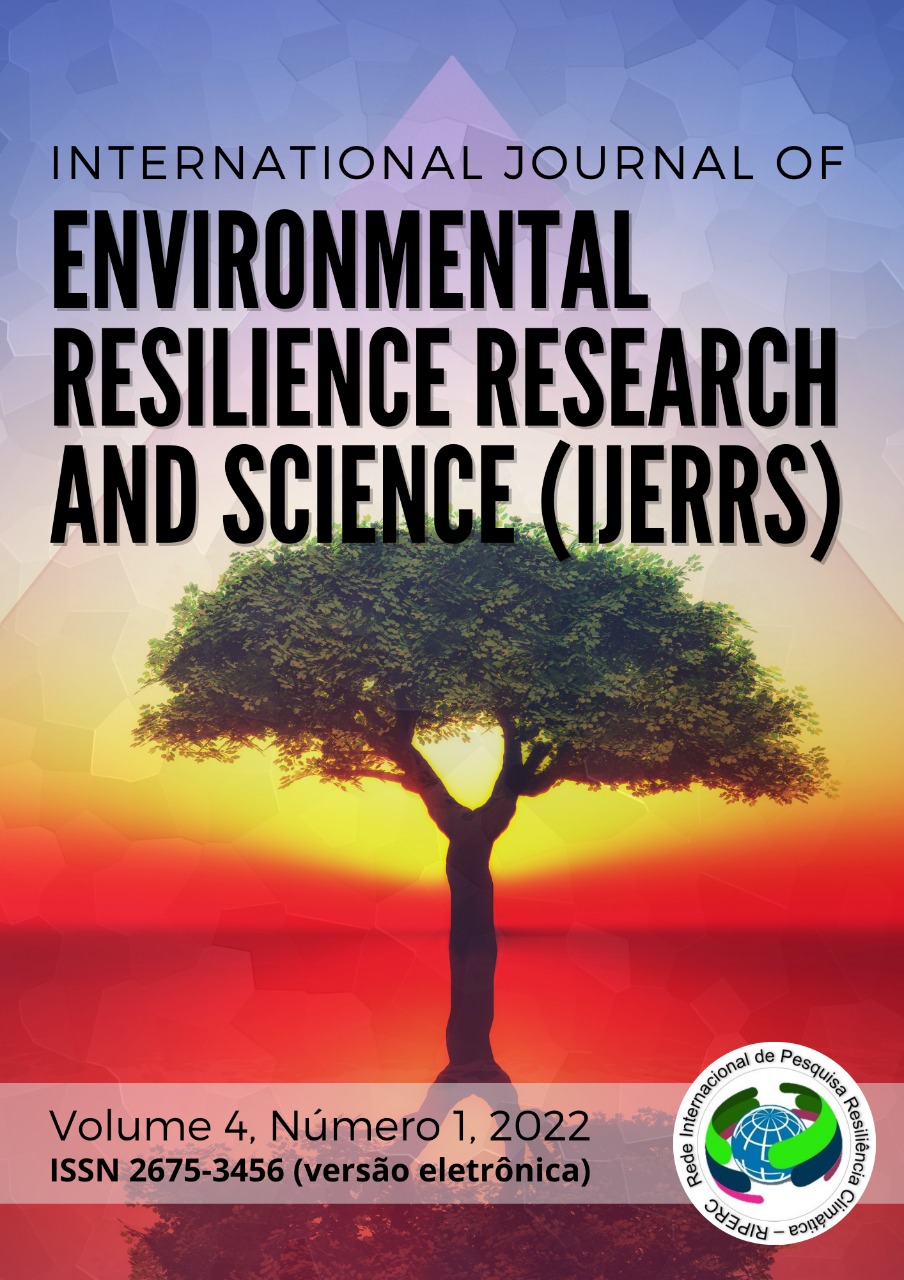AVALIAÇÃO DO ÓLEO DE CANOLA PARA PRODUÇÃO DE BIODIESEL / EVALUATION OF CANOLA OIL FOR BIODIESEL PRODUCTION
DOI:
https://doi.org/10.48075/ijerrs.v4i1.26513Keywords:
Biodiesel, Canola, Óleo, Extrusão de GrãosAbstract
A crescente conscientização acerca dos impactos da poluição gerada por combustíveis
fósseis, levou países de todo o mundo a repensarem o modo de como se utilizar energia. Em 2015 no
tratado de Paris durante a COP21 o Brasil assinou junto com mais 196 o termo de redução de CO 2 na
atmosfera. E como uma das soluções para combustível renovável o óleo de canola é uma alternativa.
O óleo é obtido das sementes das variedades de Brassica sp., e é amplamente utilizado para
alimentação humana, para lubrificação de maquinário industrial e para a produção de biodiesel. O
objetivo deste estudo foi avaliar o processo de prensagem mecânica de grãos de canola em diferentes
temperaturas e velocidades de rotação em uma extrusora mecânica com automação. O trabalho foi
desenvolvido no laboratório da CTA, em uma prensa extrusora de grãos Z-1500. Para o presente
estudo foram definidas 4 temperaturas (110–120 °C, 120–30 °C, 130–140 °C e 140–50 °C) e 5
velocidades [1000, 1200, 1400, 1600 e 1800 RPM (Rotações por minuto). Foi empregado um design
experimental 4 × 5 fatorial para determinar o rendimento de extração de óleo, massa específica do óleo
e teor de proteínas na massa bromatológica
References
Akinoso, R., Raji, A. O., & Igbeka, J. C. (2009). Effects of compressive stress, feeding rate and speed of rotation on palm kernel oil yield. Journal of Food Engineering, 93(4), 427–430.
BARBOSA, JC; MALDONADO, JUNIOR, W. (2015) AgroEstat - sistema para análises estatísticas de ensaios agronômicos. Jaboticabal: FCAV/UNESP, 396p
Bassi, G. F.; Maciel, M. R. W. (2003) Caracterização de óleos naturais. In: XI Congresso Interno de Iniciação Científica da Unicamp.
BUENO P.L., LEWANDOSKI C. F., SANTOS R. F., RODRIGUES H. V., BATISTA J. A. Automação 4.0 de prensa extrusora e aplicação energética de óleo de linhaça REVISTA TÉCNICO-CIENTÍFICA CREA-PR. 2019.
Canola Council of Canada (2020) What is canola?. Dísponivel em: <https://www.canolacouncil.org/oil-and-meal/what-is-canola/> Acesso em 5 de Setembro de 2020
CONAB (2017). Companhia Nacional de Abastecimento. Acompanhamento da safra brasileira: V. 4 - SAFRA 2016/17- N. 11.
EMBRAPA (2014). Origem e usos da canola. Disponível em: < http://www.cnpt.embrapa.br/biblio/do/p_do149_2.htm#:~:text=O%20teor%20de%20%C3%B3leo%20nos,%25%20(TOMM%2C%202005). > Acesso em 5 de Maio de 2020
ERYILMAZ, T. et al. (2016). Biodiesel production potential from oil seeds in Turkey. Renewable & Sustainable Energy Reviews, v. 58, p. 842-851
Evangelista, R. L. (2009). Oil extraction from Lesquerella seeds by dry extrusion and expelling. Industrial Crops and Products, 29(1), 189–196.
Evon, P., Vandenbossche, V., Pontalier, P. Y., Rigal, L., 2014. New thermal insulation fiberboards from cake generated during biorefinery of sunflower whole plant in a twin-screw extruder. Ind Crops Prod. 52, 354–362.
Evon, P., Vinet, J., Labonne, L., Rigal, L., 2015. Influence of thermo-pressing conditions on the mechanical properties of biodegradable fiberboards made from a deoiled sunflower cake.
Kartika, I. A., Pontalier, P. Y., & Rigal, L. (2006). Extraction of sunflower oil by twin screw extruder: Screw configuration and operating condition effects. Bioresource technology, 97(18), 2302-2310.
Kartika, I. A., Pontalier, P. Y., & Rigal, L. (2010). Twin-screw extruder for oil processing of sunflower seeds: Thermo-mechanical pressing and solvent extraction in a single step. Industrial crops and products, 32(3), 297-304
LEWANDOSKI C.F.; SANTOS R. F.;RODRIGUES H.V.;SILVA E. T. C.;LEWANDOSKI S. Automação 4.0 de esmagadora de grãos e aplicação energética de óleo de Crambe International Journal of Environmental Resilience Research and Science 189-212. 2019
MOREIRA, I.; SCAPINELLO, C.; MURAKAMI, A.E. (1993) Utilização do farelo
de canola na alimentação de suínos na fase de crescimento. In:
CONGRESSO BRASILEIRO DE VETERINÁRIOS ESPECIALISTAS
EM SUÍNOS, 6.,1993, Goiânia. Anais... Concórdia:EMBRAPACNPSA, p.143.
Rigon, C.A.G.; Goergen, A.B.; Bordin, R.; Pilla, R.B.; Zanatta, T.P.; Silva, V.R.; Tomm, G.O. (2017). Características agronômicas, rendimento de óleo e proteína de canola em diferentes épocas de semeadura. Revista Brasileira de Tecnologia Agropecuária. v. 1, n. 2 p. 124-132.
Savoire, R., Lanoisellé, J. L., & Vorobiev, E. (2013). Mechanical continuous oil expression from oilseeds: a review. Food and Bioprocess Technology, 6(1), 1-16.
Hawkins, D. and Weisberg, S. (2017) Combining the Box-Cox Power and Generalized Log Transformations to Accomodate Nonpositive Responses In Linear and Mixed-Effects Linear Models South African Statistics Journal, 51, 317-328.
Instituto Adolfo Lutz (2008). Métodos físico-químicos para análise de alimentos. São Paulo: Instituto Adolfo Lutz.
TOMM, G. O. et al. Tecnologia para produção de Canola no Rio Grande do Sul. Passo Fundo: Embrapa Trigo, 41p. (Embrapa Trigo. Documento online, 113). 2009. Disponível em: <http://www.cnpt.embrapa.br/biblio/dop_do113.htm>. Acesso em: 20 setembro de 2020.
Tomm G. O. (2016) Canola: Planta que traz muitos benefícios à saúde humana, e cresce em importância no Brasil e no mundo. http://www.cnpt.embrapa.br/culturas/canola/a_planta_que_Deus_criou.pdf. Acesso em 12 de Maio de 2019
Zambom MA, Santos GT, Modesto EC, Alcalde CR, Gonçalves GD, Silva DC, Silva KT, Faustino JO. Valor nutricional da casca do grão de soja, farelo de soja, milho moído e farelo de trigo para bovinos. Acta Scientiarum, 23(4):937-943, 2001.
Comprovante de inscrição no 6º Encontro Anual de Iniciação Científica, Tecnológica e Inovação – EAICT 2020
Downloads
Published
How to Cite
Issue
Section
License
Copyright (c) 2022 International Journal of Environmental Resilience Research and Science

This work is licensed under a Creative Commons Attribution-NonCommercial-ShareAlike 4.0 International License.
Aviso de Direito Autoral Creative Commons
Política para Periódicos de Acesso Livre
Autores que publicam nesta revista concordam com os seguintes termos:
1. Autores mantém os direitos autorais e concedem à revista o direito de primeira publicação, com o trabalho simultaneamente licenciado sob a Licença Creative Commons Attribution que permite o compartilhamento do trabalho com reconhecimento da autoria e publicação inicial nesta revista.2. Autores têm autorização para assumir contratos adicionais separadamente, para distribuição não-exclusiva da versão do trabalho publicada nesta revista (ex.: publicar em repositório institucional ou como capítulo de livro), com reconhecimento de autoria e publicação inicial nesta revista.
3. Autores têm permissão e são estimulados a publicar e distribuir seu trabalho online (ex.: em repositórios institucionais ou na sua página pessoal) a qualquer ponto antes ou durante o processo editorial, já que isso pode gerar alterações produtivas, bem como aumentar o impacto e a citação do trabalho publicado (Veja O Efeito do Acesso Livre).
Licença Creative Commons
Esta obra está licenciada com uma Licença Creative Commons Atribuição-NãoComercial-CompartilhaIgual 4.0 Internacional, o que permite compartilhar, copiar, distribuir, exibir, reproduzir, a totalidade ou partes desde que não tenha objetivo comercial e sejam citados os autores e a fonte.









